In the Beginning Was the Word: The King James Bible 400th | reviews, news & interviews
In the Beginning Was the Word: The King James Bible 400th
In the Beginning Was the Word: The King James Bible 400th
The revision of the Bible in 1611 changed the English language
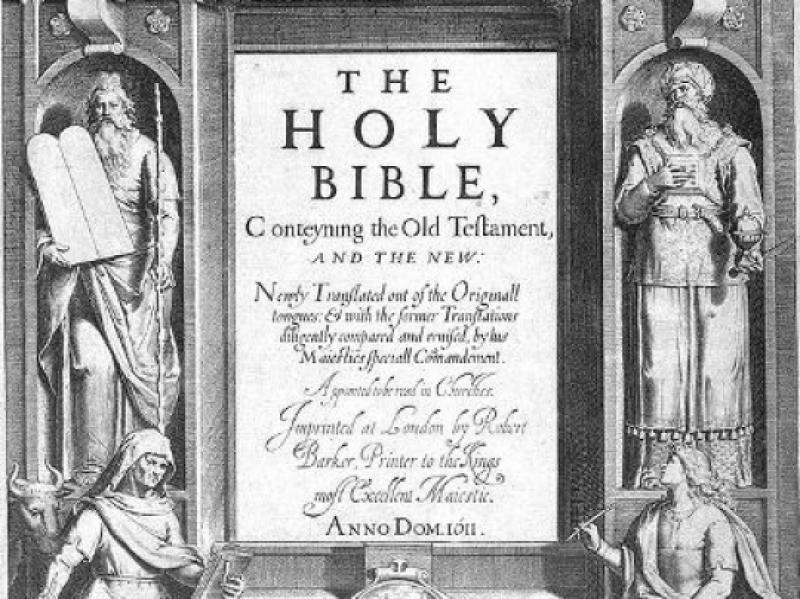
The King James Bible, that great monument in the biography of the English language, is 400 years old this year. To use its own wording, it is as old as the hills, as old as Methuselah. Contemporaneous with Shakespeare, it has given us as many of the richly colourful phrases by which we still live: a nest of vipers, a thorn in the flesh, a fly in the ointment, a lamb to the slaughter, the skin of your teeth, in the twinkling of an eye. And so on and on.
Fittingly, Shakespeare's Globe in London are marking the birthday. In Port Talbot there is a passion play featuring Michael Sheen and the Manic Street Preachers, in Edinburgh a five-storey exhibition, in London a play based on each of the Bible's 66 books and in Birmingham a new choral commission. You can also listen again to James Naughtie's Radio 4 documentary. The writers who have gone the extra mile to bring you these pearls are Alexandra Coghlan, David Nice, Veronica Lee, Jasper Rees, Aleks Sierz and James Woodall. We hope it's to your heart's desire.
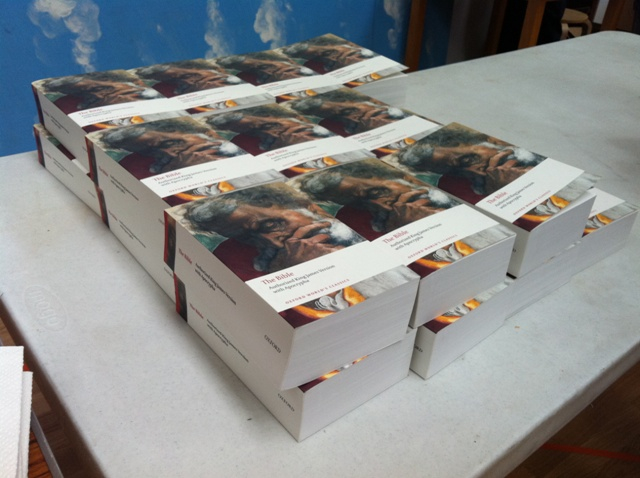 The Bible, Shakespeare's Globe, today-Easter Monday
The Bible, Shakespeare's Globe, today-Easter Monday
At Shakespeare’s Globe, the entire King James Version will be read from today, Palm Sunday, to Easter Monday. In four groups of five, 20 actors will recite all 1,189 verses of the text, a unique event lasting a total of 69 hours. Directed by Jacqueline Somerville, the idea developed from a workshop in February, inspired in turn by Globe artistic director Dominic Dromgoole’s experience of a verbatim theatre project with refugees.
“The actors for that,” says Somerville, “had a refugee’s words played into their ear, learnt the phrasing and physically embodied the words, and found a characterisation for them. We’re using exactly the same technique; but here, our actors are recording their own chapters, so will hear their best performance, which they’ll then immediately deliver.”
One of the actors involved, Bethan Walker, adds, “There’s a lot I’ve got out of reading the Bible over the years and it’ll be interesting to look at it on a slightly more academic and performance level. I’m not a scholar at all but can’t wait to go back to basics and start with Genesis.”
The contemporaneity of the King James to Shakespeare’s plays makes it an apparent gift for the Globe. But the truth is that almost all the latter had been written by the time the KJV was published. Over four centuries, conflating the two - surely the King James must be “in” Shakespeare - has been facilitated by the slightly later date of the First Folio’s publication: 1623.
They remain entirely discrete enterprises, yet both texts remain none the less two giant pebbles thrown in the English-language pool whose ripples resonate in our culture. If Shakespeare’s outdoor theatre can be remade on the Thames, why not parade in it the other truly great literary artefact of his age? JW
- The Bible reading takes place at Shakespeare's Globe, London, from today till Easter Monday. Today, 10am-midnight, Genesis to Deuteronomy; tomorrow, 6pm-midnight, Joshua to 1 Samuel; Tuesday 6pm-midnight, 2 Samuel to 2 Kings; Wednesday 6pm-midnight, 1 Chronicles to Nehemiah; Thursday 6pm-midnight, Esther, Job and Psalms; Good Friday 9am-midnight, Proverbs to Malachi (end of Old Testament); Easter Saturday, closed; Easter Sunday 9am-5pm (New Testament) Matthew, Mark, Luke, John; Easter Monday, 10am-7.30pm, Acts to the Book of Revelation (end of New Testament)
The Story of the King James Bible, Radio 4, still available on BBC iPlayer
James Naughtie's chaste documentary is helpfully divided into a trinity of three programmes: the Father of the 1604 Hampton Court conference which kicked it all off, the Son of the translation-in-progress and the Holy Ghost of the KJB's influence throughout the world. He takes us, trying as hard as he can to evoke a sense of place, from the great hall, chapel and council chamber of the royal palace to Oxford in episode two and to discussions of the spread of the English word in London's George Inn, St Paul's Cathedral and the Southbank Centre.
Imagine this on telly: it would be swamped in background music as well as overloaded with images. Whereas the first time music creeps in with an unashamedly ropey rehearsal of Tallis by the Corpus Christi choir is well past the halfway mark. In the third episode we have on-site illustration of Handel's Messiah and a delicious clip of Max Romeo's "The Macabee Version". That's by no means a frivolous interlude, telling us as it does of the perceived superiority of King James's legacy. Hear it in its entirety here.
The royal advocate himself comes over as a queasy mixture of pomposity, with his flatulent phrases about the divine right of kings, and earthiness: we learn how he thought he "peppered" the Puritans in 1604 and told them "a turd for your argument".
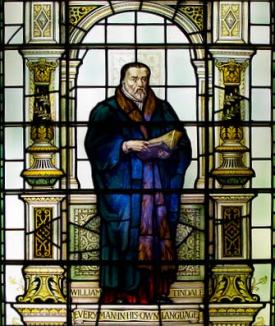 No, the real hero for me is the much humbler man who first gave England a Bible in its own language, William Tyndale (the window to him in Hertford College described by Naughtie pictured right). He wanted, like Erasmus, the Bible to be the ploughboy's companion; such phrases as "bald as a coot" and "salt of the earth" come from him, not the King James version - though that too, of course, filtered endless colloquialisms into the language we still unknowingly use today; and it was the Tyndale Bible which served as inspiration for Shakespeare, not the KJB (though that drew extensively on the 1539 example). Tyndale, whose persecuted existence and hideous execution provide some of the background to Hilary Mantel's masterly novel Wolf Hall, seems to come out best in these programmes, even if his appearance is all too brief; and at least his society seems to have been pleased with the results. DN
No, the real hero for me is the much humbler man who first gave England a Bible in its own language, William Tyndale (the window to him in Hertford College described by Naughtie pictured right). He wanted, like Erasmus, the Bible to be the ploughboy's companion; such phrases as "bald as a coot" and "salt of the earth" come from him, not the King James version - though that too, of course, filtered endless colloquialisms into the language we still unknowingly use today; and it was the Tyndale Bible which served as inspiration for Shakespeare, not the KJB (though that drew extensively on the 1539 example). Tyndale, whose persecuted existence and hideous execution provide some of the background to Hilary Mantel's masterly novel Wolf Hall, seems to come out best in these programmes, even if his appearance is all too brief; and at least his society seems to have been pleased with the results. DN
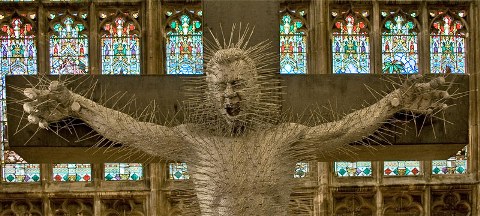
David Mach: Precious Light, Edinburgh City Gallery
The religious sculpture that most gallery-goers will know is fashioned from organic materials: the wooden saints of Donatello, Michelangelo’s marble Pieta, the Della Robbia terracotta altarpieces, Ghiberti’s bronze doors. So what is one to make of a new 20-foot crucifixion which will go on show this year fashioned from thousands of coat hangers? “I don’t make work out of bronze,” says Scottish artist David Mach. “I’m doing it with this unlikely, naff material because coat hangers are something you don’t give a second thought to. It’s getting to another audience. You’re not talking to the guy who loves art. You’re trying to reach people who would rather set you on fire and chuck you in the river than pay attention to what you do.”
Lest we forget, the King James version was a Scottish commission. Die Harder, the coat-hanger Crucifixion, will form the centre piece of Precious Light, a show mounted at City Art Centre in Edinburgh to mark the 400th anniversary of the King James Bible. It will also include a coat-hanger Calvary and a huge number of Mach’s trademark collages. The idea grew out of Mach’s collage national portrait for the Millennium Dome exhibition in 2000. “That was a huge effort. I remember at the time thinking, I should do the Bible next. You get all those big epic stories, all that struggle, violence, sex, mayhem, pestilence, famine. That’s the stuff for me.”
A limited-edition King James version was initially mooted with images created by Mach. “You’re looking to make this thing that you’ll be able to sell in numbers for a lot of money and you’ll make a mint in the process.” When lawyers got involved he pulled out. The idea languished for a while, partly because, in these godless times, when Mach first approached the contemporary galleries which have exhibited him before, “they all start backing out of the room. It’s like a weird subject they don't want to touch. ‘Where are we going to sell that?’” But eventually the City Art Gallery gave Mach five floors to fill.
For 10 weeks at the City Art Gallery, one floor will be devoted to Mach and his studio making collages on site which the public can watch. It should make for fascinating viewing. His collages include a broiling inferno opening up under the Eiffel Tower, the stations of the cross dramatised in front of St Paul’s Cathedral, while the animals are making their way in pairs towards a Noah’s Ark in front of Table Mountain. You get the picture: the Bible story as a global event. JR
- Precious Light at the City Art Centre, Edinburgh from 30 July to 16 October
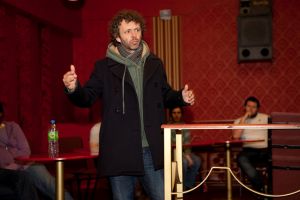 The Passion of Port Talbot, Port Talbot, Good Friday-Easter Sunday
The Passion of Port Talbot, Port Talbot, Good Friday-Easter Sunday
In what promises to be the most ambitious theatrical event of the year, a cast of 1,000 headed by Michael Sheen are staging The Passion of Port Talbot over three days at Easter. This will be the climactic production in the fleet-footed NTW’s acclaimed opening year. Mounted in association with the Cornish company WildWorks, it will start at dawn on Good Friday on the beach at Aberavon when a local man who has disappeared for 40 days and nights will return dirty and bedraggled. Sheen, who is of course a famous native in a town famous for breeding them (Burton, Hopkins) will be in character playing what he coyly calls “a Jesus figure” over three days until he is crucified on a traffic island at sunset on Easter Sunday.
The production will evoke but not quite revive Port Talbot’s tradition of producing a Passion play in nearby Margam Park, featuring local amdram and church groups. The new play, written by Owen Sheers, will bring a bit of Jerusalem to a town which is generally unloved and usually unnoticed by people flying by on the M4. The Garden of Gethsemane will be a patch of grass between council houses. An old working men’s club (pictured above with Sheen and cast) will host the Last Supper (live entertainment supplied by The Manic Street Preachers).
Sheen will pop in for tea in a house in Llewellyn Street, which is much like any other tightly hemmed-in terrace street but for one key difference: only half of it is there. The other half was razed to make way for the M4, constructed throughout the 1960s. A forest of concrete stilts holds up the motorway where the north terrace of Llewellyn Street once stood. “My town is the joke of the area,” says Sheen over the roar of traffic. “People say it’s horrible and it’s ugly and it’s smelly and there’s nothing here and it’s literally bypassed, literally overlooked. Subliminally the columns of the motorway are saying, ‘You’re not worth looking at.’” Well, the town won’t be passed over this Passover.
Sheen’s movements will be beamed to the crowds on giant screens. Potentially anyone who comes to watch will be in it too, caught on camera by two documentary crews and a film crew making the movie version directed by polymath artist Dave McKean. The Manic Street Preachers will also be playing at the Last Supper. JR
- The Passion of Port Talbot, 22-24 April
Michael Sheen visits Llewellyn Street, Port Talbot
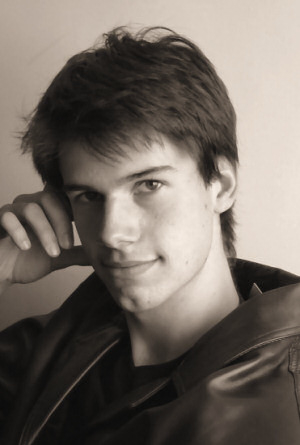 Alexander Campkin Commission, Birmingham Cathedral
Alexander Campkin Commission, Birmingham Cathedral
“In the beginning was the Word, and the Word was with God, and the Word was God.” The familiar rhythms of John 1-14 – often known as the “Great Reading” – have echoed through generations of Christians, but most potently in the simple monumentality of their King James translation. While English composers have long sought inspiration in this cornerstone text, setting sections or extracts, a new commission supported by Birmingham Cathedral will celebrate the 400th anniversary of the King James Bible with a complete setting on an unprecedentedly grand musical scale.
Responsible for creating the work scored for full orchestra, choir and organ is Alexander Campkin, an award-winning young British composer (pictured right) quickly gaining a reputation for his music both in the UK itself and in Europe. Chosen for his particular sensitivity to text, Campkin’s personal response to his material is evident. “John 1, 1-14 is very passionate, strong and moving,” he explains. “It’s daunting and the meaning so profound that it almost defies musical interpretation.”
The challenges of the commission do not end here however. While the work in its initial format will be performed in concert with orchestra, it will also be adapted and re-orchestrated to produce liturgical music for this year’s Advent and Christmas services at the Cathedral. It’s a process that will not only offer a musical connection between the liturgy of these services, but will also allow as many people as possible to encounter and engage with the work and its text.
Local church and school choirs will be some of the first to benefit, taking part in a workshop in November, and the flexible orchestration of Campkin’s final score, will allow different ensembles to perform and reinterpret it. Engaging the broader community with contemporary music is no easy task, and one that has materially shaped Campkin’s composition. He aims to create a work “in a contemporary yet accessible idiom” capable of matching the emotional impact of the text itself and hoping “to move some to joy, to elation or to tears”. AC
King James Bible Trust
The trust (whose patron is Prince Charles) was established to celebrate not just the 400th anniversary of the King James Bible but also its impact in history and on language throughout the English-speaking world. The trust is supporting dozens of events, discussions, exhibitions and readings throughout the world during 2011; there are too many to list here, but some that caught my eye follow. VL
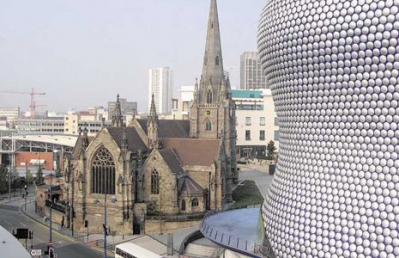 Expressions 2011, St Martin’s Church, Birmingham, until 31 Dec
Expressions 2011, St Martin’s Church, Birmingham, until 31 Dec
A year-long celebration of cultural events inspired by the Bible’s big themes (The Creation, The Fall, The Exodus, The Exile, The Return, The Messiah) in St Martin’s Church in the Bullring shopping centre near Selfridges (pictured left) - truly where God and Mammon meet.
Great and manifold blessings, Cambridge University Library, until 31 Dec
An exhibition based on the collections of Cambridge University Library showing the development of the Bible in English, culminating in the publication of the King James Bible.
Public lectures, University of Aberdeen, 4 & 12 May
Two lectures remain in this fascinating series: The King James Bible as a ‘Savage Text’ by Professor Adrian Thatcher on the uses and abuses of the Bible to spread hatred and fear; then Milton expert Professor Gordon Campbell’s The King James Bible as Literature.
Manifold Greatness, Folger Shakespeare Library, Washington DC, USA, 23 Sep-12 Jan 2012
A joint project by the Folger Shakespeare Library and the Bodleian Library at Oxford University, this exhibition assembles and interprets an extraordinary selection of rare books, manuscripts, and works of art from several libraries' extensive collections to explore the King James Bible’s wide-ranging cultural, social and literary impact in the United Kingdom, the United States and beyond.
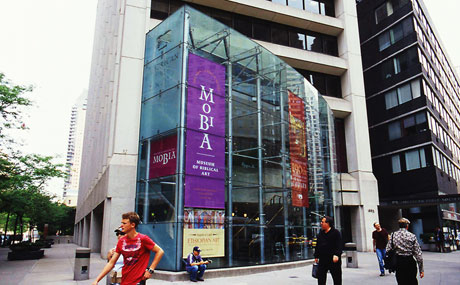 On Eagles’ Wings, Museum of Biblical Art, New York City, USA, 8 July-18 Sep
On Eagles’ Wings, Museum of Biblical Art, New York City, USA, 8 July-18 Sep
An exhibition that will explore the historic context in which the King James Bible was translated and published, beginning with an examination of its predecessors, most notably the Bishop’s Bible sponsored by Queen Elizabeth in 1568. (MoBiA pictured right.)
Great and manifold, Thomas Fisher Rare Book Library, Toronto, Canada, until 30 May
An exhibition of rare Bibles and biblical manuscripts from medieval sources through the Reformation and into the 21st century at the University of Toronto.
Sixty-Six Books, Bush Theatre
The Bush Theatre in west London is a small venue but it has enormous ambitions. Having just opened the doors of its new building, in the Old Shepherds Bush Library, it has also announced a huge project, Sixty-Six Books, which is a co-production between the theatre and the King James Bible Trust. In October, the new theatre will trumpet its nativity by staging an epic performance cycle which will feature more than 100 artists from across the globe. Yes, this is Genesis as well as Exodus.
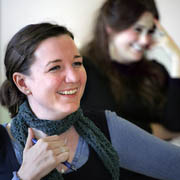 Sixty-six writers, including the Archbishop of Canterbury, Wole Soyinka, Jeanette Winterson, Carol Ann Duffy and Billy Bragg, and other disciples of the pen, have made an individual and contemporary response to one book of the King James Bible. Playwrights, poets, songwriters, novelists and comedians from all faiths and none, and from over a dozen countries and involving five continents, will be part of this begetting of themes ancient and modern.
Sixty-six writers, including the Archbishop of Canterbury, Wole Soyinka, Jeanette Winterson, Carol Ann Duffy and Billy Bragg, and other disciples of the pen, have made an individual and contemporary response to one book of the King James Bible. Playwrights, poets, songwriters, novelists and comedians from all faiths and none, and from over a dozen countries and involving five continents, will be part of this begetting of themes ancient and modern.
Curated by artistic director Josie Rourke (pictured right) and associate director Christopher Haydon, Sixty-Six Books will begin and end with two ambitious 24-hour performances during which you can experience all 66 responses. This Alpha and Omega event will be an immersive experience, meaning that all your senses will be engaged as every nook and cranny of the new venue will be part of the marathon, which will also spill out to several other sites across the capital. So you can probably expect a cast of Biblical proportions, some moments of famine and perhaps the odd miracle of theatrical revelation. AS
Share this article
The future of Arts Journalism
You can stop theartsdesk.com closing!
We urgently need financing to survive. Our fundraising drive has thus far raised £49,000 but we need to reach £100,000 or we will be forced to close. Please contribute here: https://gofund.me/c3f6033d
And if you can forward this information to anyone who might assist, we’d be grateful.

Subscribe to theartsdesk.com
Thank you for continuing to read our work on theartsdesk.com. For unlimited access to every article in its entirety, including our archive of more than 15,000 pieces, we're asking for £5 per month or £40 per year. We feel it's a very good deal, and hope you do too.
To take a subscription now simply click here.
And if you're looking for that extra gift for a friend or family member, why not treat them to a theartsdesk.com gift subscription?

Add comment